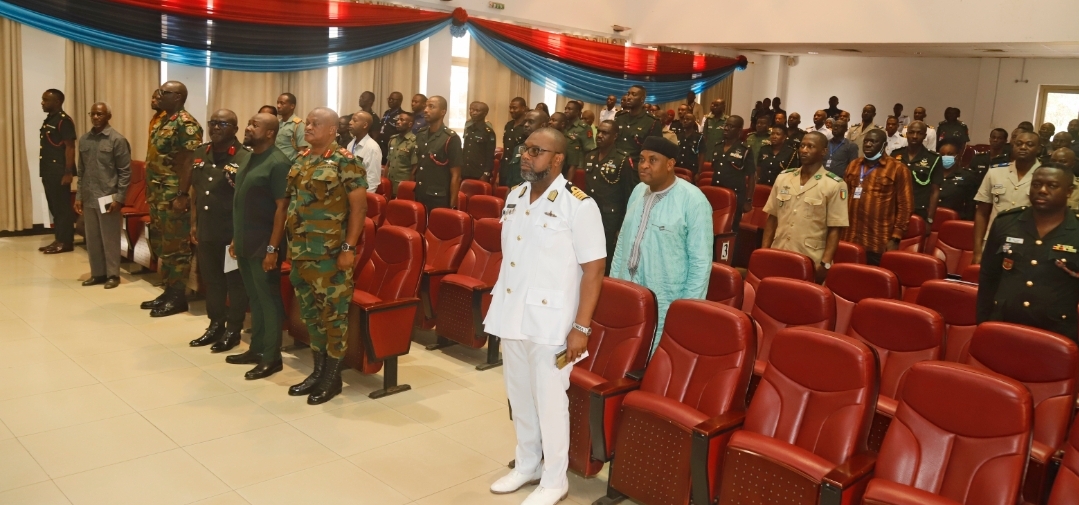Littoral states have a growing need to ensure accountability and oversight over their Exclusive Economic Zones (EEZ), concerning safety and security-related activities; and policies should be created and filtered by highly trained personnel, to encourage private and government sector investments, to ensure that maritime threats are well confronted.
This call was made by Mr Senyo Kwasi Hosi – Founder, Cleave & Hold Ltd, as Guest of Honour, at the Ghana Armed Forces Command and Staff College (GAFCSC) when the military college commenced its one week Maritime Sector Governance Course (MSGC), as part of its 2023/24 Academic Calendar, on Monday 12 February 2024, at the Hamidu Hall, Otu Barracks, Teshie, Accra.

Mr Hosi stated that efforts in addressing bottlenecks in the maritime sector are often hampered by inappropriate institutional designs and organisational cultures, poor institutional coordination, as well as the lack of resources, and that there is the need to ensure a more professional and holistic understanding of EEZ management and operations by all stakeholders.
Further stating the essence of the MSGC, Mr Hosi said the Gulf of Guinea (GoG) area hosts many sensitive infrastructure and resources that are key to socio-economic viability, making the safety and security of the marine domain a matter of optimum concern for policymaking.
He said in recent times, there has been the realisation of the vast potential that the sea and its related water bodies contribute to economic development, besides the traditional fishing and oil industries, as most littoral states now have, as economic and security priorities, the management and operations in the maritime environment.

He continued that such actions of littoral states, are the results of the enormous opportunities and challenges emanating from the recognition of the exclusive rights for the exploitation of the extensive sea areas, which in the case of Ghana is approximately 64,000 square nautical miles.
Stating a claim for the Course, Mr Hosi said the efficient and effective management of the maritime sector of a country, is a way of protecting her maritime resources and interests, for which reason, systematic, focused, effective management and control of the maritime domain, should involve several activities which fit into specific categories.
He cited the categories as; 1) Management of Marine Resources, including minerals and ecological resources; 2) Maintenance of law-and-order at sea, consisting of prevention of illegal activities; 3) Safety of Navigation and Transit through the EEZ; 4) Safety of lives and property at sea; 5) Protection and preservation of the Marine Environment; and 6) Involvement in the management of the maritime domain, including inland waters.

The Guest of Honour stated that Ghana’s marine territory is about 70% its land mass coverage, but for decades, more recognition has been given to land-based economic activities in its developmental efforts, whiles little attention is paid to economic activities in the maritime space.
Stating the capabilities of the sea, the Guest of Honour said over 80% of the world’s known and estimated hydrocarbon reserves are found in the marine zone, while in Ghana, additional oil exploration is yielding new oil finds, which could soon put the country among the oil giants on the continent, as fish from the sea provides over 70% of the total main source of protein for the population, with 90% of fishes caught in the ocean harvested within 200 nautical miles.
Finally, Mr Hosi had a word of admonishment generally, that policy is what governments and organizations do and not just what they say, for which reason, policy without action is no policy, but simply a vain declaration of intent.
The one-week MSGC ’24 is also intended to engender the political and institutional will needed, to favourably consider decisions affecting the effective and efficient protection of the enormous resources in the EEZ.
EEZs extend sovereign rights up to 200 nautical miles for exploitation, conservation and management of natural resources, and empowers coastal states like Ghana, to take authoritative fishery management decisions, which control not only the behaviour of a particular state’s nationals, but all other nationals.
MSGC 2024 is one of the modules under GAFCSC’s prestigious Master of Science (MSc) in Defence and International Politics (MDIP), Senior Staff Course 45, which is training ninety-eight (98) Officers/students of seventeen African Armed Forces from Benin, Burkina Faso, Botswana, Cote d’Ivoire, Gambia, Ghana, Guinea, Liberia, Malawi, Nigeria, Namibia, Rwanda, Sierra Leone, South Africa, Togo, Tanzania and Zambia, for eleven months in Command and Staff responsibilities.
Present at the ceremony included the Acting Commandant, GAFCSC – Brigadier General Seidu Abass; Acting Assistant Commandant – Colonel (Col) William Kwabiah; Chief Coordinator – Col Maxwell Mantey, Directors, Chief Instructors, Senior Research Fellows, Directing Staff, and representatives of selected maritime stakeholders in Ghana.
By Kofi Ampeah-Woode
